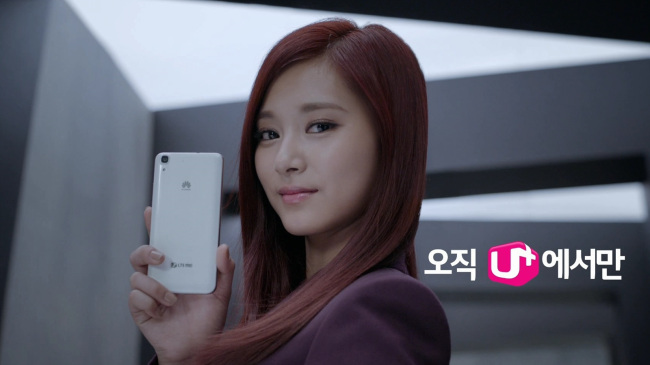LG Uplus halts online ads featuring Taiwanese K-pop singer
By Kim Young-wonPublished : Jan. 18, 2016 - 14:18
Controversy over a Taiwan-born K-pop singer, who became the center of a political dispute between China and Taiwan for holding the national flag of the island nation on a TV show, is affecting the IT sector in Korea.
Mobile carrier LG Uplus said Monday that it would “temporarily stop the online commercials for Chinese handset-maker Huawei’s Y6 smartphone,” featuring Chou Tzu-yu, better known as Tzu-yu here, a member of multinational K-pop band Twice.
Mobile carrier LG Uplus said Monday that it would “temporarily stop the online commercials for Chinese handset-maker Huawei’s Y6 smartphone,” featuring Chou Tzu-yu, better known as Tzu-yu here, a member of multinational K-pop band Twice.

The move is said to be aimed at avoiding any possible negative impact stemming from the issue on the business operations of other LG Group affiliates, including LG Electronics, LG Chem and LG Display, in China.
LG Uplus, however, stressed that the contract with Twice is still valid as it would continue to work with the K-pop band for TV commercials.
An LG Uplus official was quoted as saying in a news report that “the company will make a decision whether to resume the online commercial for the Y6 after monitoring the circumstances.”
Tzu-yu’s flag-waving gesture on the Korean TV show, which conservative Chinese news outlets described as disobedience to the Chinese government, has become a bone of contention in recent days in China, Taiwan and Korea.
The Chinese government is making a big push for the one-China policy, which aims to unite mainland China and the island nation.
After the controversy flooded Web portals and social media in the three nations, the teenage singer, due mainly to mounting pressure, apologized in a video.
“I feel extremely apologetic to my company and to netizens on both sides of the (Taiwan) Strait for hurting them with my improper behavior,” Tzu-yu said in the video.
The controversy, however, did not easily subside as political figures from Taiwan, including the newly elected president Tsai Ing-wen, politicized the matter, expressing opposition against China’s authoritarian policy.
“As more smartphone-makers including Xiaomi are currently trying to tap into the Korean market -- the home turf of Samsung Electronics and LG Electronics -- mobile carriers may feel like they have to take more cautious measures in conducting their marketing campaigns for those Chinese products not to provoke any controversy and not to upset the Chinese government,” an industry official said.
By Kim Young-won (wone010@heraldcorp.com)







![[KH Explains] How should Korea adjust its trade defenses against Chinese EVs?](http://res.heraldm.com/phpwas/restmb_idxmake.php?idx=644&simg=/content/image/2024/04/15/20240415050562_0.jpg&u=20240415144419)










![[Today’s K-pop] Stray Kids to return soon: report](http://res.heraldm.com/phpwas/restmb_idxmake.php?idx=642&simg=/content/image/2024/04/16/20240416050713_0.jpg&u=)